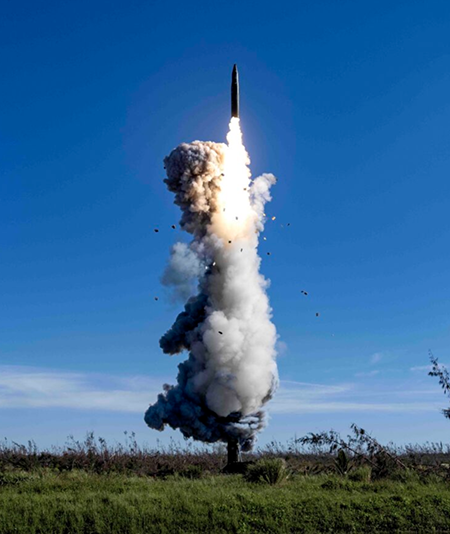“For half a century, ACA has been providing the world … with advocacy, analysis, and awareness on some of the most critical topics of international peace and security, including on how to achieve our common, shared goal of a world free of nuclear weapons.”
China Conducts Rare ICBM Test Over Pacific
November 2024
By Shizuka Kuramitsu
China conducted a rare test launch of an intercontinental ballistic missile (ICBM) over the Pacific Ocean on Sept. 25, the country’s first launch in international waters since 1980.

In a statement, the Chinese Defense Ministry announced that its rocket force conducted the test “carrying a dummy warhead to the high seas in the Pacific Ocean.” It described the “launch as a routine arrangement in our annual training plan…in line with international law and international practice.”
Despite claims about a “routine” training exercise, the test was unusual. It was conducted publicly, with the Chinese military distributing photos via the state-run Xinhua News Agency, and was the first test in international waters in 44 years. Since 1980, China’s ICBM tests have taken place within Chinese territory, including roughly 135 ballistic missile tests in 2021, according to the U.S. Defense Department 2022 China Military Power report.
The Sept. 25 missile was launched from Hainan Island, and the reentry vehicle landed near French Polynesia’s exclusive economic zone, north of Tahiti, after traveling approximately 11,500 kilometers.
Several analysts said that the missile likely was a Dong Feng-31AG, one of China’s newest and most advanced ICBMs. The delivery range is expected to be 7,000 kilometers to 11,700 kilometers, with the ability to reach most of the continental United States, according to the Center for Strategic and International Studies Missile Defense Project.
Xinhua reported on Sept. 25 that “China notified the relevant countries in advance” of the launch. Pentagon spokesperson Sabrina Singh confirmed at a press briefing that same day that the United States “were given some advance notice.”
“We certainly welcome” this advance notice to the United States as it “is a good thing and that is moving in the right direction in terms of…getting that advanced notification and that further reduces the risks of any misperception and miscalculation,” Singh said.
In addition to the United States, China also gave advance notice to Australia, France, and New Zealand, according to various news reports on Sept. 25.
The United States has been pressing China to be more transparent about its nuclear program. (See ACT, June 2024.)
Hans Kristensen of the Federation of American Scientists posted on social media that to track the Chinese test, the United States “deployed an RC-135 Cobra Ball aircraft to collect optical and electronic data of the missile and warhead.”
Meanwhile, countries in the Pacific region including Australia, Fiji, and New Zealand voiced concerns about the launch. Moetai Brotherson, the president of French Polynesia, “expressed his…disappointment that Polynesia was not informed the missile was directed towards its waters,” Outremers 360 reported on Sept. 26. Kiribati made clear that it "does not welcome China's recent ICBM test," Reuters reported on Oct. 8.
Hui Zhang of the Belfer Center for Science and International Affairs at the Harvard Kennedy School, writing on the Bulletin of the Atomic Scientists website on Oct. 16, speculated that the test may have been aimed at dissuading the United States from using nuclear weapons in a potential conflict across the Taiwan Strait.
He also suggested that the test showed that Beijing is increasingly confident of its capabilities and this may offer an opening for risk reduction talks with Washington.
Meanwhile, Reuters reported on Oct. 9 that six security analysts and four diplomats evaluating the launch said that “although the rare test carried political messaging amid China’s nuclear weapons buildup, it also met a long-overdue need for the [Chinese] Rocket Force to ensure its nuclear deterrent worked as advertised.”
Kristensen, in that report, said that the test “enabled the Chinese to carry out a test with a full attack profile. In operational terms, this is inevitably an important step.... [T]he test represents the operational validation of the entire system.”
Meanwhile, Timothy Wright, a missile researcher at the International Institute for Strategic Studies, told Reuters that the test gave the Chinese military a “great opportunity” to evaluate how well it could track long missile flights.
"China's network of satellites, ground stations and tracking ships is still evolving, and there are question marks over just how effective its space-based [intelligence, surveillance, and reconnaissance] capabilities are," Wright said.
This ICBM test was followed by a report in The Wall Street Journal on Sept. 26 that a new Chinese nuclear-powered submarine sank at a shipyard in Wuhan. Beijing has not issued an official statement regarding the submarine report.
